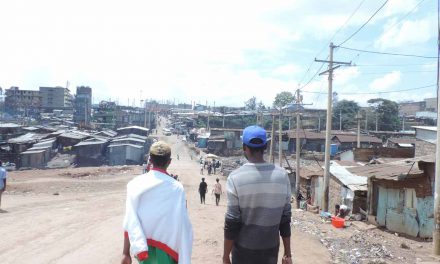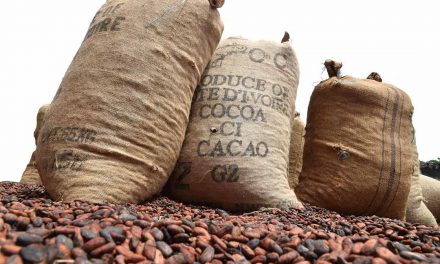Foreign policy priorities under Biden: implications for South Africa, Africa and the world
One of the major challenges for the United States administration under Joe Biden is the management of domestic and global expectations following the disruptive presidency of Donald Trump, whose actions at home and abroad continue to reverberate beyond his term in office. Many of the aftershocks will thus remain with the Biden administration.
Some of the foreign policy decisions of the Trump administration have had far-reaching implications across the world. Whether due to an aggressive trade war against China and some of its own transatlantic European allies, or through its decision to move the US embassy to Jerusalem and recognise Israeli settlements in Palestine, some of these decisions will be difficult to backtrack on.
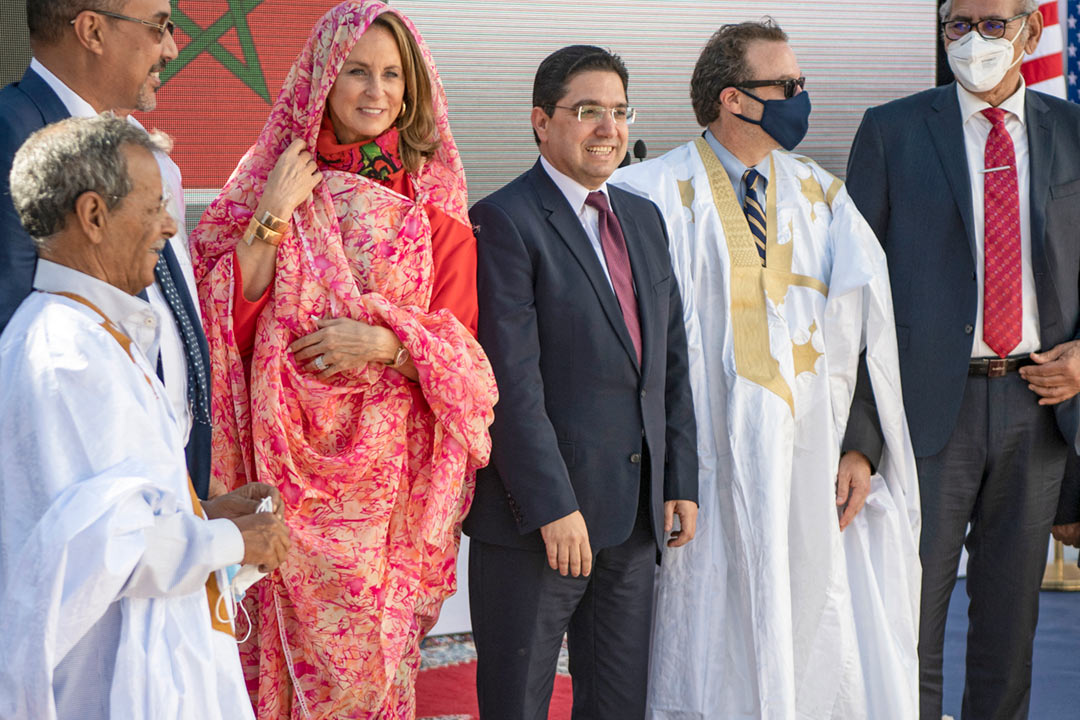
Moroccan Foreign Minister Nasser Bourita (C) and David Schenker, US Assistant Secretary of State for Near Eastern Affairs – who is wearing a traditional dress for men called “Darraa” – (center-R) pose for a picture after their meeting in in Dakhla, in Morocco-administered Western Sahara, on January 10, 2021. – Schenker is visiting the contested Western Sahara after Washington recognised Morocco’s sovereignty there in exchange for Rabat normalising ties with Israel. Western Sahara is a disputed and divided former Spanish colony, mostly under Morocco’s control, where tensions with the pro-independence Polisario Front have simmered since the 1970s. (Photo by Fadel SENNA / AFP)
The US position on Morocco and Western Sahara is another situation that the Biden administration will be tested on. Having increasingly sought to withdraw from global institutions it played an integral role in establishing under Trump, the US administration will also have a difficult task convincing international partners that it can be relied on, and that the Trump phenomenon was just an anomaly rather than a sign of things to come. Domestic challenges in the US have also been exacerbated by the COVID-19 pandemic, with the country being one of the most affected in the world. This is impacting on social cohesion and the ability of the new administration to effectively execute its key priorities.
South Africa and its African counterparts may thus have to tame their expectations given that the Biden administration will, in the short term, be largely concerned with national questions related to the pandemic and challenges of social cohesion. The police killing of George Floyd and others like him, the Black Lives Matter Movement, and the storming of the Capitol in light of the increased threat of domestic right-wing terrorism, have all unleashed a plethora of challenges that will likely occupy the new administration for some time. This will have foreign policy implications, and South Africa and its African partners will have to craft a strategy based on a few concise areas of convergence for African political, social, and economic actors.
It is thus important to proactively engage with state and non-state actors in the US on a set of key African priorities for the Biden administration to consider. Some of that will include efforts to reverse Trump-era policies on Israel and Palestine, Western Sahara, and mediation efforts in the Horn of Africa, made worse by Ethiopia’s political conflict in the Tigray region. Given the longstanding links between South African stakeholders and members of the US anti-apartheid movement, it will be important to revive those ties at a non-governmental level in the early days of the Biden administration.
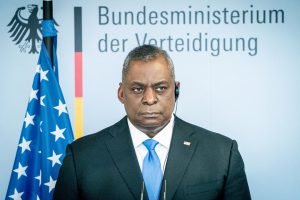
US Defence Secretary Lloyd Austin addresses a joint press conference with the German Defence Minister after a meeting in Berlin, on April 13, 2021. (Photo by Kay Nietfeld / POOL / AFP)
The Biden administration has made the pronouncement that “America is back”; however, it remains an open question what type of world the US is coming into. Indeed, sometimes it is assumed that the US can simply slot back in where it left off and be readily welcomed back. However, this is an unrealistic expectation, as many parts of the world have continued their economic and political objectives in the absence of the US as it withdrew from important treaties such as the Paris Treaty on Climate Change and the World Health Organization (WHO) in the midst of a pandemic. This has even caused strategic partners in the European Union to speak more about European strategic autonomy, given the reality that the Trump phenomenon may continue to linger in the US for some time.
The Biden administration has thus sought to mend alliances with traditional partners and position the US to again become a respected power. However, this will not be a straightforward process as many parts of the world reflect on the possibility that a Trump-like presidency may happen again in the near future. In turn, some European leaders have been prompted to advocate for having greater control of the key value chains for the production of high-tech goods that will be important for the future. What has also been apparent is that, due to the fact that the Trump administration was belligerent and did not cultivate good relations with China, Biden will find it difficult to change the policy trajectory towards a more confrontational relationship, especially when the majority of the US population, both Democrats and Republicans, express distrust towards Beijing. This will likely constrain the Democratic Party government as it seeks to appear strong for the domestic population, and is especially the case given the reality that while the Trump administration spoke of a trade war, it could also be referred to as a tech war as the two countries seek to improve their competitiveness in the industries of the future.
Having noted the domestic constraints for the Biden administration, it will be important for African stakeholders to familiarise themselves with the key personnel of the current administration, some of whom also served during the Obama government. This is important in crafting a proactive South African and African strategy towards the US that takes into account the track record of appointed officials and the domestic constraints faced by the administration. Some of the important positions that have already been filled include Secretary of State Antony Blinken, Chair of House Foreign Affairs Committee Gregory Meeks, Defense Secretary Lloyd Austin, Administrator of USAID Samantha Power, and US Trade Representative Katherine Tai.
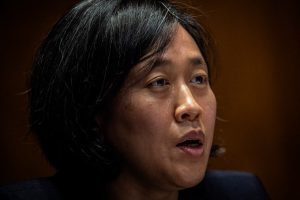
WASHINGTON, DC – APRIL 28: U.S. Trade Representative Katherine Tai testifies during the Senate Appropriations subcommittee hearing on the proposed budget for fiscal year 2022 for the Office of the U.S. Trade Representative on Capitol Hill on April 28, 2021 in Washington, DC. Bill O’Leary-Pool/Getty Images/AFP (Photo by POOL / GETTY IMAGES NORTH AMERICA / Getty Images via AFP)
South Africa and its African partners will thus have to ensure the proposed agenda is not so broad that it limits the creation of concrete programmes. The proposed agenda could thus be limited to three key areas, namely economic development, regional integration, and geopolitics.
Under economic development, African stakeholders can already begin to envision and deliberate on a post-African Growth and Opportunity Act (AGOA) trading relationship with the US that factors in the African Continental Free Trade Area (AfCFTA). South Africa’s diplomatic team in the US could thus already put out feelers to get a sense of the evolving US trade agenda, especially related to Africa. This would include a proactive engagement with US counterparts at USAID to ensure the continued support to development efforts on the continent, especially for the least developed countries (LDCs).
However, these discussions could also dwell on how South Africa and partners in Africa could work with the US on triangular cooperation projects. Indeed, South Africa has worked with USAID and Irish Aid on various triangular cooperation projects with potato farmers in Malawi and Lesotho. Given the growing importance of triangular cooperation to the implementation of the sustainable development goals, these discussions could identify potential development areas on which to work together in Africa.
With the importance of regional integration to African efforts to play a more important role in global affairs, it will be important that it remains one of the key areas that African actors focus on in their relations with the US. AfCFTA will serve as a catalyst for ramping up efforts to accelerate regional integration. African stakeholders will thus need to be proactive in focusing US efforts towards catalytic projects that are able to galvanise regional integration efforts, including through the identification of cross-border infrastructure projects and providing support to customs officials to build the necessary capacity to enforce new trade rules.
Lastly, African stakeholders will have to raise geopolitical dynamics on the continent with the US, especially in rebuffing efforts to force African countries to choose between China and the US in their international engagements. African stakeholders will also have to ensure that issues such as Libya, Western Sahara, and Ethiopia-Egypt-Sudan mediation efforts on the Grand Ethiopian Renaissance Dam project remain a priority in terms of moving away from some of the Trump-era posturing and decision-making.
With South Africa integral to African efforts to coordinate an effective COVID-19 response, it will be important for the country to build on this role. No longer being the chairperson of the AU, the country remains a champion of the African response to the pandemic in recognition of its role thus far. South Africa should also build on its leadership role in the WTO, where it is leading efforts for a waiver on the intellectual property rights related to the production of vaccines, especially during a pandemic. This would allow countries of the global South, especially, to use some of their manufacturing capacity to upscale the production of vaccines in order to meet the current demand. While they are opposed by large pharmaceutical companies and many developed countries, these calls are gaining momentum among state and non-state actors across the globe. It is thus important to ask whether this momentum can be harnessed for a leadership role beyond the pandemic.
South Africa will however have to acknowledge that ground has been lost in recent years, and refocus its diplomatic efforts towards Southern Africa, especially when it is preparing to chair the Southern African Development Community (SADC) Organ for Politics, Defence, and Security in August 2021. Indeed, if South Africa loses any more ground in Southern Africa, it will make it much more difficult for it to play an influential role in the African continent and beyond.
Dr. Philani Mthembu is Executive Director at the Institute for Global Dialogue, an independent foreign policy think tank based in Tshwane (Pretoria), South Africa. His recent publications include a single authored book titled ‘China and India's Development Cooperation in Africa: The Rise of Southern Powers’, a co-edited book titled ‘From MDGs to Sustainable Development Goals: The Travails of International Development’, a co-edited book titled ‘Africa and the World: Navigating Shifting Geopolitics’, and a co-edited book titled ‘Africa-China Cooperation: Towards an African Policy on China?’



